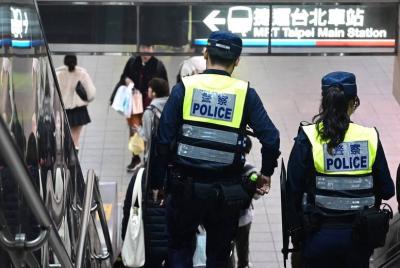A 66-year-old man in Taichung nearly died after drinking raw blood from deer and softshell turtles, Chen Hung-chih (陳虹志), a nephrologist at Asia University Hospital, said on Thursday.
The patient, surnamed Chu (朱), was showing signs of septic shock, as well as multiple organ failure, when he arrived at the hospital, Chen said.
Chu had no previous history of diabetes or other chronic conditions, and exhibited no noticeable signs of infection in the lungs or the skin, although he did have a mild case of bacilluria, Chen said, adding that Chu had also not traveled abroad in the past six months, so his condition was very odd.
During his first two days of hospitalization, Chu did not respond well to broad-spectrum antibiotics, Chen said, adding that after running a blood culture, they discovered that the septic shock was caused by antibiotic-resistant strains of Escherichia coli (E coli).
After Chu’s condition stabilized, his family told Chen that he had been hanging out with friends and that the group had drunk raw deer and softshell turtle blood, adhering to a traditional belief that doing so would make them stronger and more virile.
While Chu’s friends also showed signs of fever, they did not suffer as severely as Chu, perhaps because they had laced their raw blood with kaoliang liquor, Chen said.
Citing a 2008 National Taiwan University study, which concluded that river water in Taiwan contained traces of antibiotics and other medicine, Chen said that, although he could not be sure, the E coli infection might have been due to the softshell turtle being raised on a turtle farm, as farms often use antibiotics to prevent animals from getting sick.
While E coli is native to the human intestinal tract, it can infect the urinary tract or other parts of the body, Chen said.
Chen said that the antibiotic-resistant strain of E coli had probably entered Chu’s body and developed into bacteremia, causing septic shock.

Beijing could eventually see a full amphibious invasion of Taiwan as the only "prudent" way to bring about unification, the US Department of Defense said in a newly released annual report to Congress. The Pentagon's "Annual Report to Congress: Military and Security Developments Involving the People's Republic of China 2025," was in many ways similar to last year’s report but reorganized the analysis of the options China has to take over Taiwan. Generally, according to the report, Chinese leaders view the People's Liberation Army's (PLA) capabilities for a Taiwan campaign as improving, but they remain uncertain about its readiness to successfully seize

Taiwan is getting a day off on Christmas for the first time in 25 years. The change comes after opposition parties passed a law earlier this year to add or restore five public holidays, including Constitution Day, which falls on today, Dec. 25. The day marks the 1947 adoption of the constitution of the Republic of China, as the government in Taipei is formally known. Back then the Chinese Nationalist Party (KMT) governed China from Nanjing. When the KMT, now an opposition party in Taiwan, passed the legislation on holidays, it said that they would help “commemorate the history of national development.” That

Taiwan has overtaken South Korea this year in per capita income for the first time in 23 years, IMF data showed. Per capita income is a nation’s GDP divided by the total population, used to compare average wealth levels across countries. Taiwan also beat Japan this year on per capita income, after surpassing it for the first time last year, US magazine Newsweek reported yesterday. Across Asia, Taiwan ranked fourth for per capita income at US$37,827 this year due to sustained economic growth, the report said. In the top three spots were Singapore, Macau and Hong Kong, it said. South

Police today said they are stepping up patrols throughout the Taipei MRT system, after a social media user threatened to detonate a bomb at an unspecified station this afternoon. Although they strongly believe the threat to be unsubstantiated, Taipei Metro police and the Railway Police Bureau still said that security and patrols would be heightened through the system. Many copycat messages have been posted since Friday’s stabbing attacks at Taipei Main Station and near Zhongshan MRT Station that left three dead and 11 injured, police said. Last night, a Threads user in a post said they would detonate a bomb on the Taipei